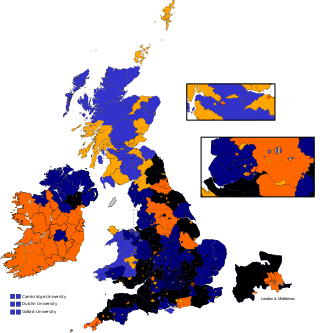
East Gloucestershire, formally the Eastern division of Gloucestershire and often referred to as Gloucestershire Eastern, was a parliamentary constituency in Gloucestershire, represented in the House of Commons of the Parliament of the United Kingdom. It elected two Members of Parliament (MPs) using the bloc vote system.
South Essex was a county constituency represented in the House of Commons of the Parliament of the United Kingdom from 1832 to 1885. It elected two Members of Parliament (MPs) using the bloc vote system.

North Cheshire is a former United Kingdom parliamentary constituency. It was created upon the division of Cheshire in 1832. In 1868 it was abolished with South Cheshire to form East Cheshire, Mid Cheshire, West Cheshire and Stalybridge.
East Cheshire was a parliamentary constituency which returned two Members of Parliament (MPs) to the House of Commons of the Parliament of the United Kingdom. Elections were held using the bloc vote system.

North Derbyshire was a Parliamentary constituency in the United Kingdom. It returned two Knights of the Shire to the House of Commons of the Parliament of the United Kingdom.

North Lincolnshire, formally known as the Northern Division of Lincolnshire or as Parts of Lindsey, was a county constituency in the Lindsey district of Lincolnshire. It returned two Members of Parliament (MPs) to the House of Commons of the Parliament of the United Kingdom.

East Kent was a county constituency in Kent in South East England. It returned two Members of Parliament (MPs) to the House of Commons of the Parliament of the United Kingdom, elected by the first past the post system.
South Wiltshire, formally known as the Southern division of Wiltshire or Wiltshire Southern was a county constituency in the county of Wiltshire in South West England. It returned two Members of Parliament to the House of Commons of the Parliament of the United Kingdom, elected by the bloc vote system.

East Suffolk was a county constituency in Suffolk, England. It elected two Members of Parliament to the House of Commons of the Parliament of the United Kingdom by the bloc vote system of election.

West Surrey was a parliamentary constituency in the county of Surrey, which returned two Members of Parliament (MPs) to the House of Commons of the Parliament of the United Kingdom, elected by the bloc vote system.

West Sussex was a parliamentary constituency in the county of Sussex, which returned two Members of Parliament to the House of Commons of the Parliament of the United Kingdom, elected by the bloc vote system.

East Sussex was a parliamentary constituency in the county of Sussex, which returned two Members of Parliament to the House of Commons of the Parliament of the United Kingdom, elected by the bloc vote system.
East Worcestershire was a county constituency in the county of Worcestershire, represented in the House of Commons of the Parliament of the United Kingdom.

West Norfolk or Norfolk Western was a county constituency in the county of Norfolk, which returned two Members of Parliament (MPs) to the House of Commons of the Parliament of the United Kingdom, elected by the bloc vote system.
North Staffordshire was a county constituency in the county of Staffordshire. It returned two Members of Parliament (MPs) to the House of Commons of the Parliament of the United Kingdom, elected by the bloc vote system.

North Nottinghamshire, formally the "Northern Division of Nottinghamshire" was a county constituency represented in the House of Commons of the Parliament of the United Kingdom. It elected two Members of Parliament (MPs) by the block vote system of election.
South Nottinghamshire, formally the "Southern Division of Nottinghamshire" was a county constituency represented in the House of Commons of the Parliament of the United Kingdom. It elected two Members of Parliament (MPs) by the bloc vote system of election.
North Leicestershire, formally the "Northern Division of Leicestershire", was a county constituency represented in the House of Commons of the Parliament of the United Kingdom. It elected two Members of Parliament (MPs) by the bloc vote system of election.

South Lincolnshire, formally called the Southern Division of Lincolnshire or Parts of Kesteven and Holland, was a county constituency in Lincolnshire. It returned two Members of Parliament (MPs) to the House of Commons of the Parliament of the United Kingdom, elected by the bloc vote electoral system.
The Western Division of Suffolk was a county constituency in Suffolk, England. It elected two Members of Parliament to the House of Commons of the Parliament of the United Kingdom by the bloc vote system of election.

